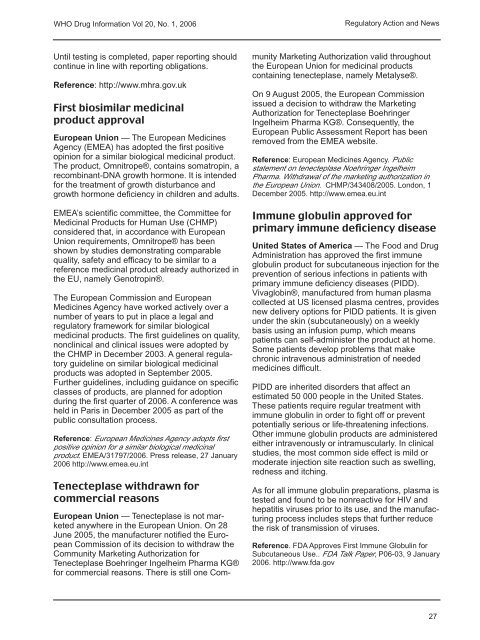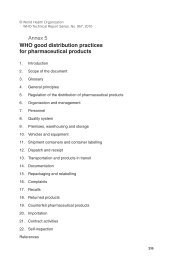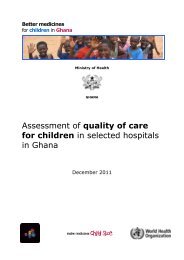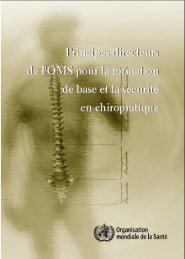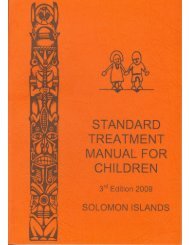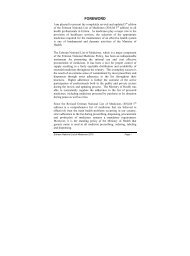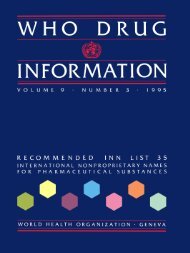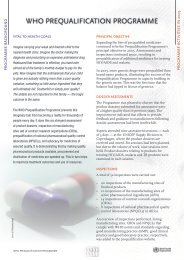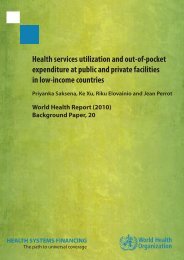WHO Drug Information Vol. 20, No. 1, 2006 - World Health ...
WHO Drug Information Vol. 20, No. 1, 2006 - World Health ...
WHO Drug Information Vol. 20, No. 1, 2006 - World Health ...
Create successful ePaper yourself
Turn your PDF publications into a flip-book with our unique Google optimized e-Paper software.
<strong>WHO</strong> <strong>Drug</strong> <strong>Information</strong> <strong>Vol</strong> <strong>20</strong>, <strong>No</strong>. 1, <strong>20</strong>06Regulatory Action and NewsUntil testing is completed, paper reporting shouldcontinue in line with reporting obligations.Reference: http://www.mhra.gov.ukFirst biosimilar medicinalproduct approvalEuropean Union — The European MedicinesAgency (EMEA) has adopted the first positiveopinion for a similar biological medicinal product.The product, Omnitrope®, contains somatropin, arecombinant-DNA growth hormone. It is intendedfor the treatment of growth disturbance andgrowth hormone deficiency in children and adults.EMEA’s scientific committee, the Committee forMedicinal Products for Human Use (CHMP)considered that, in accordance with EuropeanUnion requirements, Omnitrope® has beenshown by studies demonstrating comparablequality, safety and efficacy to be similar to areference medicinal product already authorized inthe EU, namely Genotropin®.The European Commission and EuropeanMedicines Agency have worked actively over anumber of years to put in place a legal andregulatory framework for similar biologicalmedicinal products. The first guidelines on quality,nonclinical and clinical issues were adopted bythe CHMP in December <strong>20</strong>03. A general regulatoryguideline on similar biological medicinalproducts was adopted in September <strong>20</strong>05.Further guidelines, including guidance on specificclasses of products, are planned for adoptionduring the first quarter of <strong>20</strong>06. A conference washeld in Paris in December <strong>20</strong>05 as part of thepublic consultation process.Reference: European Medicines Agency adopts firstpositive opinion for a similar biological medicinalproduct. EMEA/31797/<strong>20</strong>06. Press release, 27 January<strong>20</strong>06 http://www.emea.eu.intTenecteplase withdrawn forcommercial reasonsEuropean Union — Tenecteplase is not marketedanywhere in the European Union. On 28June <strong>20</strong>05, the manufacturer notified the EuropeanCommission of its decision to withdraw theCommunity Marketing Authorization forTenecteplase Boehringer Ingelheim Pharma KG®for commercial reasons. There is still one CommunityMarketing Authorization valid throughoutthe European Union for medicinal productscontaining tenecteplase, namely Metalyse®.On 9 August <strong>20</strong>05, the European Commissionissued a decision to withdraw the MarketingAuthorization for Tenecteplase BoehringerIngelheim Pharma KG®. Consequently, theEuropean Public Assessment Report has beenremoved from the EMEA website.Reference: European Medicines Agency. Publicstatement on tenecteplase <strong>No</strong>ehringer IngelheimPharma. Withdrawal of the marketing authorization inthe European Union. CHMP/343408/<strong>20</strong>05. London, 1December <strong>20</strong>05. http://www.emea.eu.intImmune globulin approved forprimary immune deficiency diseaseUnited States of America — The Food and <strong>Drug</strong>Administration has approved the first immuneglobulin product for subcutaneous injection for theprevention of serious infections in patients withprimary immune deficiency diseases (PIDD).Vivaglobin®, manufactured from human plasmacollected at US licensed plasma centres, providesnew delivery options for PIDD patients. It is givenunder the skin (subcutaneously) on a weeklybasis using an infusion pump, which meanspatients can self-administer the product at home.Some patients develop problems that makechronic intravenous administration of neededmedicines difficult.PIDD are inherited disorders that affect anestimated 50 000 people in the United States.These patients require regular treatment withimmune globulin in order to fight off or preventpotentially serious or life-threatening infections.Other immune globulin products are administeredeither intravenously or intramuscularly. In clinicalstudies, the most common side effect is mild ormoderate injection site reaction such as swelling,redness and itching.As for all immune globulin preparations, plasma istested and found to be nonreactive for HIV andhepatitis viruses prior to its use, and the manufacturingprocess includes steps that further reducethe risk of transmission of viruses.Reference. FDA Approves First Immune Globulin forSubcutaneous Use.. FDA Talk Paper, P06-03, 9 January<strong>20</strong>06. http://www.fda.gov27


